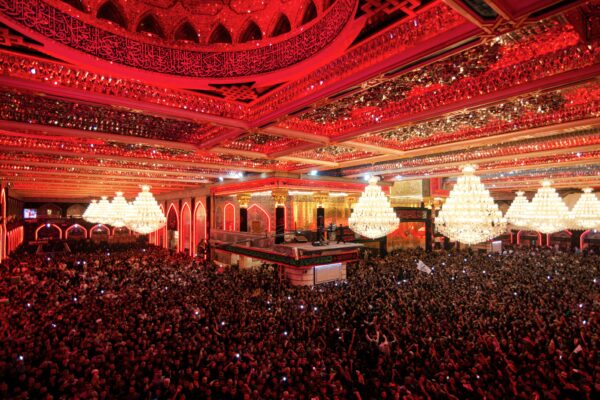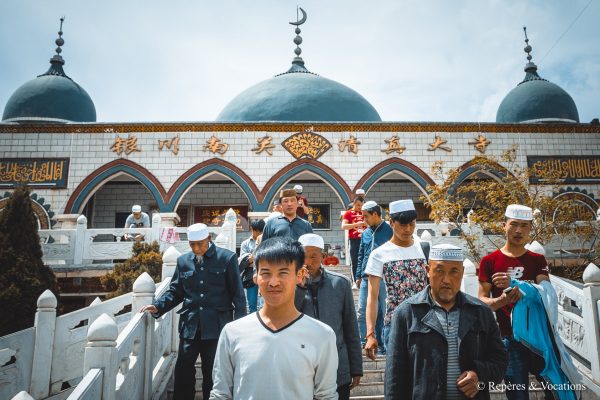“On 15th April, I discovered from Google Earth Pro map that the graveyard and tomb of my father were all destroyed. My father stayed in his tomb for only 623 days. The Chinese government said this was done in order to modernize us, but their true aim was to destroy Uyghur ethnic, cultural, and religious identities. I felt as if my father’s body had been brutally torn out of its resting place in our ancestors’ land.”
“On 15th April, I discovered from Google Earth Pro map that the graveyard and tomb of my father were all destroyed. My father stayed in his tomb for only 623 days. The Chinese government said this was done in order to modernize us, but their true aim was to destroy Uyghur ethnic, cultural, and religious identities. I felt as if my father’s body had been brutally torn out of its resting place in our ancestors’ land.”
This article was originally published on Aziz Isa Elkun’s official website here, and was republished on TMV with the author’s permission.
Over the past century, countries have used the tool of nationalism to pursue their own interests. Nationalism is about people, land, and the relationship between them. Nationalist propaganda creates a special relationship between a unique people and a particular territory.
The Uyghurs are one of the many peoples who have been left out of this tidy calculation. We are labelled as an “ethnic minority” that suits the Chinese version of statehood. China’s policy aim is to cut our ties to our land. Uyghur pilgrims are cut off from their places of worship; villages are uprooted from their fields, and families are torn apart. Islam and Uyghur culture are not separated identities of the Uyghurs, therefor they regard the burial place and graveyard as a holy place that connects the spirits of the generation past and today. Plus, the Uyghur graveyard is a symbol of belonging to each other in the Uyghur community that keeps Uyghurs connected spiritually, culturally, and politically.
Under the policies being pursued by Chinese President Xi Jinping since 2016, millions of Uyghurs are suffering inhuman treatment in the internment camps within the Uyghur region. Uyghurs in exile are also suffering because China has cut off all communication between Uyghurs at home and abroad. I want to use this opportunity to tell you my own story, as an example of how Uyghurs in exile have become desperate in response to China’s ethnic cleansing policies.
Today’s “Uyghur problem” in China is a tragic one, not a new one. Probably the current situation is one of the worst crimes that a country has openly committed against a specific ethnicity since the Second World War.
I am going to tell you my story in brief, as an example of how Uyghurs in exile have become desperate in response to China’s ethnic cleansing of the Uyghurs.
My father was born during the time of the Republic of East Turkistan in 1945. When I was born, my father and I were citizens of the People’s Republic of China, the residence of our historic fatherland East Turkistan – but China re-named it the “Xinjiang” Uyghur Autonomous Region.
I am an ethnic Uyghur. The Uyghur language is our mother tongue. I grew up in a remote village near the Tarim River, 10 kilometers away from East Turkistan’s (Xinjiang) largest prison, and I experienced extreme poverty during the “Chinese Cultural Revolution”.
What I remember most about my childhood in the late 1970s, we used to have dark days during which we could not see any sunlight, and dust fell like rain. Afterward, I learned this was linked to China conducting nuclear tests 300 kilometers away from our village in Lop Nor.
In the late 1950s, China acquired the Soviet Union’s nuclear weapon technologies and started conducting nuclear weapons tests in Lop Nor from 1964 till 1996. The last time China conducted its 45th and final nuclear test were on 29 July 1996.
Geographically, I grew up in the centre of nuclear test zones of mankind, as mentioned, 300 km in the east from our village, the Chinese Lop Nur Nuclear test, less than 1000 km in the west, Pakistan’s nuclear test sites, and in the south, India’s nuclear sites 2000 km from our village in the Northwest, Soviet Kazakhstan’s Semipalatinsk Nuclear Test Site.
Now I give you some statistics about the Uyghur population: in 1949, before the Chinese Communist Army’s occupation (Communist party -共产党) or once more inherited from the previous Chinese nationalistic government (Nationalist party -国民党), the Uyghur population in East Turkistan was nearly 3 million and the Han Chinese population was less than 250 thousand. Over the 70 years rule of my country by Chinese Communists, they systematically carried out demographic genocide by flooding Han Chinese migrants on a mass scale.
In the year 2019, the Han Chinese population in East Turkistan is more than 15 million, and this number is not including Chinese Armies, Bingtuan (Production and Construction Corps – a unique economic and paramilitary organization that belongs directly to Beijing’s administration) while the Uyghur population is 12 million, according to Chinese official census.
What I remember was our large family house with a red apple orchard where I was born and spent my first 5 years in my life. Then our family house was demolished along with other villagers and that land given to the Han Chinese migrants to use for farming. In my first year of primary school, my father built a mud-brick house with two rooms near the sand dunes after giving away our fertile land.
I hadn’t seen two things before I was 10 years old, one – Han Chinese people, second – electricity in our village. When I was in my second year at High School, I wrote a paper to commemorate the one-year anniversary of the 1985 Uyghur student demonstration and stacked that paper on the headmasters’ office door. I was arrested by county police for questioning, on the same day I was released.
I studied in the Uyghur language school from year one to year 11, and then graduated from Xinjiang University, Urumchi.
In my second year of university, in the mid-spring of 1989, for more than two months, I participated in the Tiananmen student protests to gain the rights to democracy. These nationwide student movements were violently ended by Chinese armies and tanks.
This incident became a problem for me after I graduated from University. I was fired from my job and accused of “separatism” in 1992 because of the poster I wrote in 1986 when I was 16 years old, plus my participation in the Tiananmen student protest. I had no other choice left other than to find a way to leave my country. I have lived in the UK since 2001.
My father died on 4th November 2017, and I heard of his death four days later through a friend. I wrote a letter to the Chinese embassy, appealing for a visa on humanitarian grounds in 2016 when I heard my father’s health deteriorated, but my appeal was ignored.
After New Years’ in 2018, my telephone communication with my widowed, elderly mother was cut off. Since then, I have had no news about my mother and other relatives from our village. I hope the best that my mother is alive. I wrote a story named “An unanswered telephone call” in summer 2017. A year later, I produced a short film based on my life story in exile.
I wrote a story named “An unanswered telephone call” in summer 2017. A year later, I produced a short film based on my life story in exile (found here).
On 15th April, I discovered from Google Earth Pro map that the graveyard and tomb of my father were all destroyed. My father stayed in his tomb for only 623 days. The Chinese government said this was done in order to modernize us, but their true aim was to destroy Uyghur ethnic, cultural, and religious identities. I felt as if my father’s body had been brutally torn out of its resting place in our ancestors’ land.
My family home used to have the largest orchards and land in the village, after finding the demolition of my father’s tomb, I immediately checked the family house – it looks like the house still exists but the whole orchard has completely gone. I only understood the destruction after comparing Google Earth Pro map’s capture timeline in last the 15 years.
You can check on Google map: Near Xayar, Aksu, Xinjiang, China here.
I wrote a poem for my father when I got news of his death. Here is a short excerpt:
“Dear father, you were a gardener with green fingers
Now when the thorns grow, you won’t be there to prune them.
You were a doctor, you cured so many patients
Now my heart is broken, but you are not here to cure it.
You left today in your coffin heading towards your tomb
Your son couldn’t carry you because he was not beside you.
When seven spades of soil were dropped on you
People said farewell to you and I was not there.
Let Elkun cry now because he has lost his father
I could not see you alive for the last time.”
There are many sad and tragic stories among the Uyghur diaspora community. In London, there are a few hundred Uyghur community members and they mostly live in North London. Last month, I received a text message from a friend, it said: “We would like to invite you to come to our house for the funeral. We have received information about my brother’s death. He was ill in the camp and died two weeks later after release”.
Now, whenever I think of my family and friends at home, what always comes to mind is if I didn’t leave the country, I may be one of them among the more than 3 million innocent Uyghurs in Chinese Concentration camps and I could not imagine the rest.
China is not only mass arresting millions of innocent Uyghurs, but also deliberately targeting Uyghur intellectuals including academics, writers, poets, artists, teachers and medical doctors, and so on. China claims the purpose of these internment camps is for “re-educating Uyghurs” for “vocational training” but these intellectuals do not need re-education or vocational training. They are all professionals and used to work in the Chinese government. But the fact that Chinese authorities are specifically targeting Uyghur intellectuals reveals that China is aiming to destroy Uyghur’s ethnic existence and force Uyghur to be assimilated into the Han Chinese identity.
Everyone single Uyghur in exile today can tell like me a similar story of lost and disappeared friends. This is a time of crisis for the Uyghur people.
Let us all recite Al-Fatiha for the father of Aziz. To learn more about Aziz Isa Elkun and read his poetry and stories, you can follow his website here.
To watch TMV’s previous conversation with Aziz, click below:





